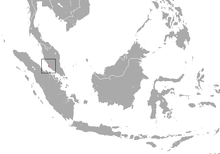The Malayan roundleaf bat (Hipposideros nequam) is a horseshoe bat found only in Malaysia. It is listed as a data deficient species.
| Malayan roundleaf bat | |
|---|---|
| Scientific classification | |
| Domain: | Eukaryota |
| Kingdom: | Animalia |
| Phylum: | Chordata |
| Class: | Mammalia |
| Order: | Chiroptera |
| Family: | Hipposideridae |
| Genus: | Hipposideros |
| Species: | H. nequam
|
| Binomial name | |
| Hipposideros nequam K. Andersen, 1918
| |

| |
| Malayan roundleaf bat range | |
Taxonomy
editIt was described as a new species in 1918 by Danish mammalogist Knud Andersen. The holotype had been collected in 1879[2] by W. Davison in Klang, Malaysia. It was presented to Andersen by Allan Octavian Hume.[3] It is considered a member of the bicolor species group within Hipposideros based on its morphology. The holotype is the only known specimen of this species.[4] As it was damaged, it is uncertain if the Malayan roundleaf bat is truly a distinct species.[1] Its species name "nequam" is Latin for "worthless."
Description
editThe forearm length of the holotype was 46 mm (1.8 in). It had a large nose-leaf of 6 mm (0.24 in) in length and 8 mm (0.31 in) in width. Its first premolar is small and its nasal septum is very thin.[3]
Range and status
editThe Malayan roundleaf bat is only known from the type locality of Klang, Malaysia.[1][3] As of 2016, it was evaluated as a data deficient species by the IUCN.[1]
References
edit- ^ a b c d Senawi, J.; Bates, P.; Francis, C. (2016). "Hipposideros nequam". The IUCN Red List of Threatened Species. 2016: e.T10152A22101545. doi:10.2305/IUCN.UK.2016-2.RLTS.T10152A22101545.en.
- ^ "1885.8.1.369". Natural History Museum. Natural History Museum's Biodiversity Informatics Group. 19 September 2014. Retrieved 6 August 2018.
- ^ a b c Andersen, K. (1918). "Diagnoses of new bats of the families Rhinolophidae and Megadermatidae". The Annals and Magazine of Natural History; Zoology, Botany, and Geology. 9. 2: 381.
- ^ Murray, Susan W; Campbell, Polly; Kingston, Tigga; Zubaid, Akbar; Francis, Charles M; Kunz, Thomas H (2012). "Molecular phylogeny of hipposiderid bats from Southeast Asia and evidence of cryptic diversity". Molecular Phylogenetics and Evolution. 62 (2): 597–611. doi:10.1016/j.ympev.2011.10.021. PMID 22079552.
